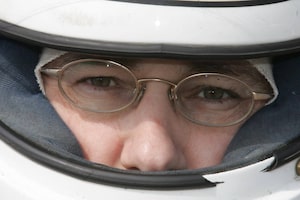Scotland's Dario Franchitti of Target Chip Ganassi Racing gets pushed out of his pit stop by his crew during the Edmonton Indy in Edmonton, Alberta, July 24, 2011.TODD KOROL
Dario Franchitti admits he wouldn't want to be the IndyCar steward responsible for meting out punishment when things go wrong on track.
The three-time IndyCar champion and two-time Indianapolis 500 winner knows it's a thankless job. But he also believes that the drivers have to know what will be punished and what won't.
And right now, the IndyCar field isn't sure where that line gets drawn.
"It's a very difficult one (job)," the Ganassi Team driver said. "I think all the drivers are kind of looking for more of a - I don't know how to say it - but we want to know what's acceptable and what's not. I think [IndyCar president of competition]Brian [Barnhart]and the guys, they're trying to address that. Hopefully, we'll get back to what we know is acceptable and what isn't."
Franchitti's comments came after the Edmonton Indy a week ago, where the stewards seemed to be calling drivers on things that they let go earlier this month on the streets in and around Exhibition Place in Toronto.
Two incidents in particular during the Edmonton race shined the spotlight on the inconsistent officiating.
On Lap 25, Oriol Servia closed the door on Mike Conway as the Andretti driver attempted to get past at Turn 12 on the City Centre Airport circuit. With no room to manoeuvre, Conway's left front tire got caught up in the Newman/Haas driver's right rear and Servia ended up planted tail first in the tire barrier lining the outside of the corner.
About halfway through the 80-lap race, Andretti's Ryan Hunter-Reay got his nose inside pole-sitter Takuma Sato at Turn 5. The KV driver turned in on his rival and was spun out of second place when their wheels touched. Hunter-Reay continued but lost the possible podium finish when he was given drive-through penalty for avoidable contact.
And, yes, both Andretti drivers - Conway and Hunter-Reay - took responsibility for the collisions and apologized for the contact after the race, but the fact remains that almost the exact same type of contact in Toronto went unpunished.
In a highly controversial incident in Toronto, Franchitti try to nose past championship rival Will Power about two-thirds of the way through the race, only to have contact spin the Penske driver out of contention. At the time, race stewards deemed it a racing incident. Two weeks later in Edmonton, Franchitti likely would have been punished for a similar move on the Alberta track.
For his part, Barnhart said he thinks there's no issue with the IndyCar officiating.
"I think we've been consistent," Barnhart told Autosport. "People are entitled to their opinions, and we've had numerous opinions. If they're coming in [to a corner]in a careless or reckless fashion and impact another car, then we'll penalize them if they are able to continue. But if you're racing and we deem it to not be overly aggressive, that way we consider it a racing incident."
That obviously wasn't the view of Edmonton winner Power, who fumed in Toronto where he got the short end of the gearshift twice. Insult was added to injury for Power when he was punted into the wall late in the race by Canadian Alex Tagliani, who also attempted a pass on the Australian that ended with wheels touching.
When he returned to the pitlane, an angry Power accused Franchitti of dirty driving and then called Tagliani a "wanker" for the contact that ended his day.
So, count the Penske driver among those pleased to see the officials clamping down in Alberta.
"I think that's what needed to happen because it will deter people from doing it again. They [drivers]know if they're going to hit someone, they're going to get a drive-through and end up at the back, as well," Power said.
"I think all the drivers - all the drivers I spoke to - they all feel the same: It needs to be more strict in every way."
Penske driver Helio Castroneves made headlines last year in Edmonton by storming to the IndyCar steward's stand following the race where he was assessed a questionable blocking penalty that took away a win.
Castroneves finished first on track in 2010, but a penalty applied after the finish pushed him to 10th.
So, it's no surprise that the Brazilian would like to the rules clarified and applied evenly when it comes to overtaking.
"It's tough because for us it's one of those things, the rule is still a little bit unclear to see what you can and what you cannot," he said.
"I just hope for next year we'll be able to find something that it's clear for the drivers so that we don't have that kind of scenario of bumping and putting the nose. Sometimes the guy that's passing you - he doesn't want to do anything - he just sees an opportunity and he just goes for it."
Senna out next week
The new documentary about the life and death of three-time Formula One world champion Ayrton Senna, who many feel is the most talented driver to ever sit in a racing car, is set to open in Canada in a limited release next week. The film, called Senna, will debut in select theatres in Montreal, Toronto, and Vancouver on Aug. 12.
The documentary directed by Asif Kapadia and written by Manish Pandey begins with Senna's F1 arrival in 1984 with the also-ran Toleman team where he delivered three podium finishes as a rookie. It ends with his death 10 years later in a high-speed crash at the 1994 San Marino Grand Prix in Imola.
There is no doubt it is a must-see for any F1 fan, and a compelling story that will also captivate those who aren't racing enthusiasts.
 Jeff Pappone
Jeff Pappone